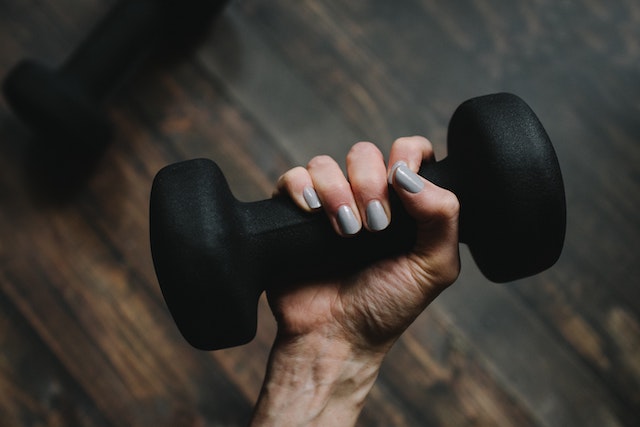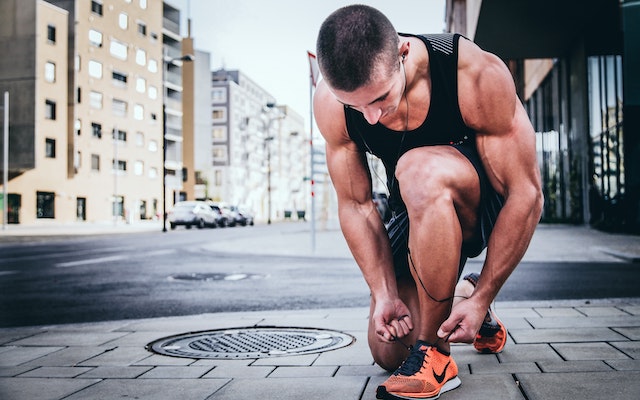Have you ever had a breakdown after a workout? While it is understandable that this is completely true after you have spent a period of time working out in the gym, or at home if it is due to external reasons, it will not be good for you. The ways to avoid post-workout crashes in this article will help you improve that.
There are many reasons why you feel tired, even do not want to exercise tomorrow. Let us give you more knowledge, which will help your training session avoid other problems.
Reasons why you feel crashed after a workout

For anyone who wants to have a strong and strong body, to do that, there is only one way, and that is exercise.
But if your training method is wrong, or you don’t know the reason and how to fix it, your health will gradually weaken. TrainRightMuscle hopes that you or anyone else will know this information to prevent it:
• You didn’t eat properly
Research shows that the best time to eat before and after exercise is 1 hour. That is the time when your body absorbs nutrients most intensely. Then the body needs to rest, and muscle growth will take 24-72 hours.
If you eat and drink too close to the time of training, or eat immediately after training, your body will easily experience a pause. That is if the body has not yet metabolized but if you have tolerated food, then you will easily feel more tired, and even want to collapse at home.
• Use a lot of functional foods
Functional foods are nutrients that support you with the purpose of improving exercise performance, health promotion and muscle growth. There are also products that support weight gain and fat loss thanks to the accompanying natural ingredients.
But one of the reasons why you crash is the caffeine content in pre-workout (a food that supports your training process).
Consuming too much caffeine will go against its effectiveness, typically you will feel more tired, have trouble sleeping at night, affect the heart, as well more prone to cramps and muscle aches.
• Spending too much time exercising
There are many people who think that by exercising a lot and for a long time, muscles will grow quickly, but that is not true. The more you practice too much in a day, the easier it is to get tired and not even want to go to work tomorrow. You are not a professional athlete, so there is no need to spend more than 2 hours just training your muscles.
On average, a day, you only need to spend 30-45 minutes and continuously for 30 days, you have a refreshing and healthy spirit. Do not spend too much on training if you are not a professional athlete.
According to the report, even athletes, even if they practice day and night, must closely follow the rest and eating plan to ensure stable mental health.
• Do not warm-up well before exercising
A seemingly small cause has big consequences later on. For heavy exercises that day like squats, and deadlifts, if you don’t warm up the joints of your legs, buttocks, thighs and arms, you will surely collapse soon after.
• You don’t take time to rest during and after exercise
If you practice like crazy, if you don’t arrange your time and divide it properly, it will also affect you more. Even if you finish practising and you start doing other things too soon like basketball, or football, you will not be healthy.
Keep these things in mind, so that you avoid unfortunate mistakes
Effective ways to help you avoid a post-workout crash

A suitable diet
To ensure that you can digest and absorb nutrients better yourself, you need to avoid overeating before exercise. Let the body have as relaxed and focused energy as possible, and arrange the time to eat 1 hour or 45 minutes in advance if you do not have much time in a day.
Don’t eat too much after exercising, and avoid acidic fruits to protect your digestion. Instead, you should eat snacks and drink lots of water to make up for lost energy earlier.
Nutrition accounts for up to 60% of the effect that you want to gain or lose fat, exercise does not take up as much as you think. So, optimize your daily meals.
Another thing is not to eat hot, greasy foods when you are preparing to exercise.
Avoid using too much caffeine
The average daily caffeine intake for an adult is 400 mg of caffeine (about 4 cups), which is for a healthy person with no underlying medical conditions to caffeine.
Caffeine is often found in supplements like pre-workout because it helps you stay in shape and stay in a much more active workout state.
Before using any functional food, you should consult your doctor and people around, and check that your condition is suitable for them.
There are many pre-workout lines for kids, from just 40 mg of caffeine that are completely effective, you can check it out here.
Vary your weights and exercises
Always know where you are, you can’t lift 120kg when you’re only 50kg, this is crazy. Even if you lift once, there is still a risk of injury to your spine, workout out every step of the way, from light weights to the point where you feel more than enough. Then take a break, and take time to eat and drink, you will grow more and you will lift heavier weights.
Give your body time to rest
After exercising, do not go home immediately, but you can use the treadmill and walk for about 5-10 minutes to cool down your body or use a motorbike.
And when you get home you can relax, have a snack, and take a shower.
Another thing is to avoid overeating in the evening, as well as get enough sleep. You don’t want your body tired when you go to bed after 11 pm and go to the gym at 6 am, then you will surely collapse immediately. Please avoid this.
Exercise properly
Why does TrainRightMuscle talk about this issue, while practising you need to pay attention to the following issues:
- Breath
- Start up
- Muscle group
Any exercise for any muscle group, whether you use weights or a machine, requires you to know how to breathe properly. Inhale deeply, and exhale gently, do not breathe too hard or too fast.
Regularly warm up before exercise, let the body regulate blood, and warm up the body.
You should know which muscle group you need to focus on that day, and use exercises for that muscle group. Do not change too much or do many different exercises, this is not necessarily good for you.
Conclusion

Above TrainRightMuscle has shown the training methods to avoid collapsing after exercise, take advantage of them, arrange a timetable and a suitable eating or exercise plan.
If you take Pre Workout, check the ingredients and consult your doctor before taking it.

